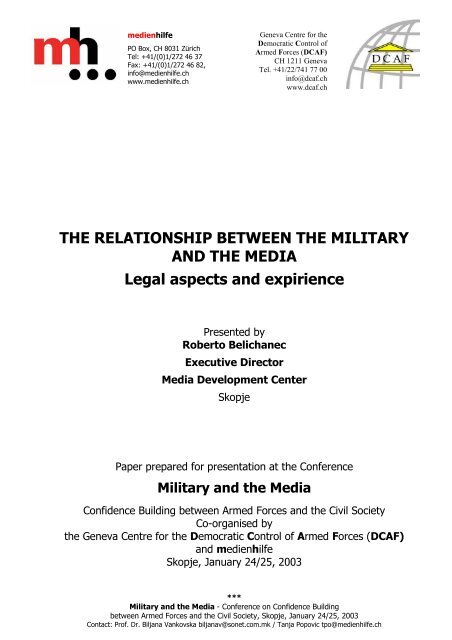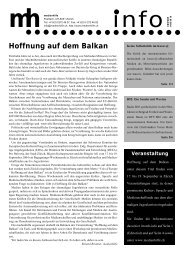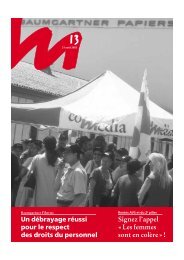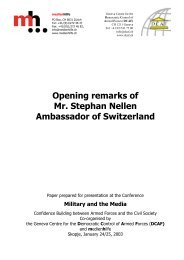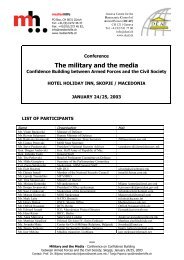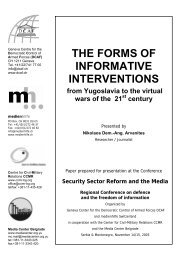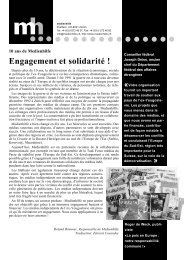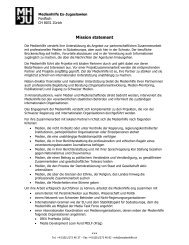Mr. Roberto Belichanec, Media Development Institute ... - medienhilfe
Mr. Roberto Belichanec, Media Development Institute ... - medienhilfe
Mr. Roberto Belichanec, Media Development Institute ... - medienhilfe
Create successful ePaper yourself
Turn your PDF publications into a flip-book with our unique Google optimized e-Paper software.
<strong>medienhilfe</strong>PO Box, CH 8031 ZürichTel: +41/(0)1/272 46 37Fax: +41/(0)1/272 46 82,info@<strong>medienhilfe</strong>.chwww.<strong>medienhilfe</strong>.chGeneva Centre for theDemocratic Control ofArmed Forces (DCAF)CH 1211 GenevaTel. +41/22/741 77 00info@dcaf.chwww.dcaf.chTHE RELATIONSHIP BETWEEN THE MILITARYAND THE MEDIALegal aspects and expiriencePresented by<strong>Roberto</strong> <strong>Belichanec</strong>Executive Director<strong>Media</strong> <strong>Development</strong> CenterSkopjePaper prepared for presentation at the ConferenceMilitary and the <strong>Media</strong>Confidence Building between Armed Forces and the Civil SocietyCo-organised bythe Geneva Centre for the Democratic Control of Armed Forces (DCAF)and <strong>medienhilfe</strong>Skopje, January 24/25, 2003***Military and the <strong>Media</strong> - Conference on Confidence Buildingbetween Armed Forces and the Civil Society, Skopje, January 24/25, 2003Contact: Prof. Dr. Biljana Vankovska biljanav@sonet.com.mk / Tanja Popovic tpo@<strong>medienhilfe</strong>.ch
- 2 -INTRODUCTIONTaking about the military and the media, the first thing that must be taken into consideration is theopposition that arises from their functions, as well as from their traditions, while, at the same time, weshould also have in mind the contemporary tendency of putting of the media in the function of warfare,which has been especially developed during World War II when the media existing at the time (radio,printed media, films, film journals, and posters) started to be used in the function of spreading of militarypropaganda.First of all we shall examine the basic points of confrontation.1. The primary function of the military is to ensure the security of the country, which often impliessecrecy that is essentially opposed to the function that media have – to inform and provide publicity inthe operation of the governmental agencies – one of the basic prerequisites for the functioning ofdemocracy.2. The military is a single, centralized organization structured according to the principles of seniority andhierarchy and presents a closed system. On the other hand, there are a great number of media, and inprinciple they are open organizations.3. The military organization has a millennium tradition and, with the exception of democratic systems,accounted only to its leader or commander. The media are relatively new phenomenon that accounts toa dispersed and not so strictly defined mass of viewers, listeners, or readers.4. The military tends toward using the media in the function of its own goals, i.e. tends to treat the mediaas tools that should be put into its function. On the other hand, the media tend toward the emancipationfrom the domination of the state’s structures, and especially from the repressive governmentmachinery.In addition to these points of confrontation there also exist some points of contact1. Both actors are necessary for the functioning of the democratic society2. Both actors have the maintenance of the Status Quo in the society as their final goal3. Both actors are active in the sphere of politics.All of the above points out to the conclusion that the relations between the media and the military are farfrom being ideal, and that, most often, their relationship is one of misunderstanding and hostility, and notof respect and cooperation. Furthermore, even if they establish cooperation, most often it is to the detrimentof the public because such cooperation is reduced to propaganda.***Military and the <strong>Media</strong> - Conference on Confidence Buildingbetween Armed Forces and the Civil Society, Skopje, January 24/25, 2003Contact: Prof.Dr. Biljana Vankovska biljanav@sonet.com.mk / Tanja Popovic tpo@<strong>medienhilfe</strong>.ch
- 3 -Totalitarian tendencies are not a new phenomenon for the military. It is also very well known that themonopoly on firepower, when left without efficient control by the civil segment could cause destructiveblows to society and lead to bloodshed. The merging of the conservative role of the Serbian mainstreammedia and the military leaders of the Yugoslav People’s Army (YPA), in the late eighties, for the purposesof preservation of the communist regime in the former SFRY, pushed both of them in the arms ofMilosevic, who used them to mobilize the Serbian society and start the series if secessionist wars that hadtragic consequences for the whole region.The establishment of the interaction between the Macedonian army and the media, and with that theinteraction between the army and the public, is an essential part of the stability of the Macedonian society.This is so out of two reasons:1. The ruling circles of the Macedonian army are composed of officers who were formed as professionalsin the YPA, which belongs to another category of social formations both in terms of organization andideology. YPA used to be a “State within a State”, and had special authorities and parallel healthcare,judicial, and pension systems. It was the most closed institution of all institutions that existed in outformal common state. This legacy became apparent immediately after the establishing of theMacedonian Army, when the new chief of the general staff confronted the Defense Minister about theissues related to the inability of the military personnel to hand over the political control of the army tothe Minister.2. At the moment Macedonia is a post-conflict society that has just got out of an armed conflict that hasno winner, and in which both parties of the war still haven’t renounced the idea of a rematch. Suchtrends are especially prominent within the circles of the para-police forces and Albanian hardcoresecessionists.Out of these reasons we should present the legal framework of the operation of Macedonian media andarmed forces.EXISTING LEGAL FRAMEWORK AND SUGGESTIONS FOR ITS IMPROVEMENTThe legal framework that regulates the security system of the Republic of Macedonia consist of theConstitution, the Law on Internal Affairs, Law on Defense, Criminal Code, and the internationalconventions that have been ratified by the Republic of Macedonia, as well as other general laws andregulations.The legal framework that regulates the operation of the media consists of the Constitution, BroadcastingLaw, Criminal Code, international conventions, and other general laws and regulations.Constitutional framework:***Military and the <strong>Media</strong> - Conference on Confidence Buildingbetween Armed Forces and the Civil Society, Skopje, January 24/25, 2003Contact: Prof.Dr. Biljana Vankovska biljanav@sonet.com.mk / Tanja Popovic tpo@<strong>medienhilfe</strong>.ch
- 4 -Chapter 7 of the Constitution of the Republic of Macedonia, under the title “The Defense of the Republicand States of War and Emergency”, regulates the Defense of he Republic of Macedonia. Article 122 of theConstitution defines the function of the armed forces in the country:Article 122The Armed Forces of the Republic of Macedonia protect the territorial integrity and independence of theRepublic.The defense of the Republic is regulated by a law adopted by a two-thirds majority vote to the total numberof Representatives.The Law on Defense and the Law on Internal Affairs elaborate the articles from this chapter of theConstitution in greater detail. In the following text we shall deal only with those articles that are ofrelevance to the relationship between the media and the armed forces, as well as with the basic provisionsthat refer to the freedoms of speech, information, and access to information.In this context we must take into consideration Article 16 of the Constitution that has the followingwording:The freedom of personal conviction, conscience, thought and public expression of thought is guaranteed.The freedom of speech, public address, public information and the establishment of institutions for publicinformation is guaranteed.Free access to information and the freedom of reception and transmission of information are guaranteed.The right of reply via the mass media is guaranteed.The right to a correction in the mass media is guaranteed.The right to protect a source of information in the mass media is guaranteed.Censorship is prohibited.This Article regulates the system of public information and public debate in the society and ensures thetransparency of the public functions, including the Defense. It is understandable that such setting of the***Military and the <strong>Media</strong> - Conference on Confidence Buildingbetween Armed Forces and the Civil Society, Skopje, January 24/25, 2003Contact: Prof.Dr. Biljana Vankovska biljanav@sonet.com.mk / Tanja Popovic tpo@<strong>medienhilfe</strong>.ch
- 5 -constitutional provisions does not provide a legal framework that will protect the legitimate interests ofDefense, especially the confidentiality of data that is of special importance for the Defense. On the otherhand, the European Convention on Human Rights, which has a higher rank than the law, functions as anintegral part of the Macedonian judicial system and provides the framework for the additional regulation ofthese legitimate interests in the specific Defense-related laws.Article 10 of the European Convention on Human Rights provides the international guarantees of thefreedom of expression and information, but, in contrast to Article 16 of the Macedonian Constitution, in thesecond paragraph it sets the limitations of that freedom in cases when it can violate some other legitimateinterest of the society, be it public or private.Article 10Freedom of expression1. Everyone has the right to freedom of expression. This right shall include freedom to hold opinions and toreceive and impart information and ideas without interference by public authority and regardless offrontiers. This article shall not prevent States from requiring the licensing of broadcasting, television orcinema enterprises.2.The exercise of these freedoms, since it carries with it duties and responsibilities, may be subject to suchformalities, conditions, restrictions or penalties as are prescribed by law and are necessary in a democraticsociety, in the interests of national security, territorial integrity or public safety, for the prevention ofdisorder or crime, for the protection of health or morals, for the protection of the reputation or the rights ofothers, for preventing the disclosure of information received in confidence, or for maintaining the authorityand impartiality of the judiciary.The second paragraph of article 10 of the European Convention on Human Rights entitles the nationallegislators to develop these principles within the relevant laws.In addition, within the frames of the European institutions there functions the European Court of HumanRights is Strasbourg, which has the jurisdiction over all countries - members that have ratified theConvention. Thus, its legal practice becomes a legal resource in the countries –members of the Council ofEurope.The Law on Defense does not contain any reference to the manner of information of the public by thearmy, and instead has several articles that may be interesting for the journalist and the media. Those are thearticles dealing with the confidentiality of data and access to different facilities.***Military and the <strong>Media</strong> - Conference on Confidence Buildingbetween Armed Forces and the Civil Society, Skopje, January 24/25, 2003Contact: Prof.Dr. Biljana Vankovska biljanav@sonet.com.mk / Tanja Popovic tpo@<strong>medienhilfe</strong>.ch
- 6 -Article 138Protection of secret data encompasses measures, activities and procedures undertaken for protection of thesecrecy of data, information and documents from the area of defense.Citizens, trade companies, public institutions and services of special importance for the defense, the unitsof local self-management and agencies of the Government responsible to keep and protect the secret dataof the defense and perform the measures determined for protection of secret data.Criteria and measures for protection of the secrecy of data of importance for the defense are issued by aGovernment regulation.Article 139The members of the Armed Forces are obligated to keep and protect the secret data of importance for theArmed Forces and perform the measures determined for their protection.Criteria for determining the secret data for the Armed Forces, which have to be kept secret and measuresfor their protection are regulated by a List of Regulations issued by the Minister of Defense.Article 140For the purpose of protecting the security of the Republic in the areas which are arranged for therequirements of the defense according to the Defense Plan or their arrangement is planned, movement andresiding may be restricted.A decision on determination of the areas from paragraph 1 of this article is made by the Government.This means that in practice a model for overcoming of conflicts between the transparency of the work ofpublic administration and the defense structures’ legitimate interest in withholding of confidential dataalready exists. It is the so-called tripartite test that is applied by the European Court of Human Rights.According to that method the medium is put in a situation where it has to whether the public interestsprevail over the damage caused by the disclosure of certain documents.For instance, the weekly magazine “FOKUS”, in 1996/97 used to publish a series of documents comingfrom intelligence sources that carried the “military secret” designation. What was common for al thosedocuments was the fact that they were either files on incompetent officers – heads of different garrisons orfiles on financial embezzlements in the procurement of equipment for the Army.In is in the public interest for the commanding officers to be competent to perform their duties, just as it isin the public interest to disclose information on how are the taxpayers’ money spent if it is done illegally or***Military and the <strong>Media</strong> - Conference on Confidence Buildingbetween Armed Forces and the Civil Society, Skopje, January 24/25, 2003Contact: Prof.Dr. Biljana Vankovska biljanav@sonet.com.mk / Tanja Popovic tpo@<strong>medienhilfe</strong>.ch
- 7 -in such manner that somebody abuses his/her power to gain profit. In other words: A document that showshow the Defense Minister pours money in his father-in-law’s firm may even be designated as “God’ssecret”, but is would still be in the domain of the public interest.The legal solution in the Law on Defense that defines what is and what is not a military secret is not reallya fortunate one since the Law does not provide a list of documents that may carry the “military secret”designation (for example, the Law on Internal Affairs provides such a list). This fact provides for wideopportunities for covering up of possible illegal actions of individuals, hidden behind the so-called interestsof the society. Therefore the first recommendation would be to amend the sections of the law that refer tothe confidentiality of data and documents, in the sense of the exact specifying of the types of documentsthat might fall in the category of military secrets. To allow for this problem to be solved on the level of aninternal rulebook of the Ministry, i.e., to regulate this issue with a secondary legislation act would be notonly frivolous but also very dangerous.The second recommendation refers to the introduction of legal provisions for regular information of thepublic through the media – This means that, firstly, the Ministry officials cannot organise press conferencesby inviting only selected media, and secondly, if an official discloses a certain information to one medium,he/she is obligated to disclose the same information to any medium that shall ask for it.There is a great hole in the Macedonian legislation. The access to the information held by government’sagencies is not regulated at all. The lack of such law also means the lack of a procedure that would allowthe citizens and the media access to documents held by the Ministry of Defense or by the Army. Therefore,the next recommended step is the adoption of a Law on access to information.These would be the bases of the legal framework. Now let us see what has been the practice of theinteraction between the media and the military structures in the past.PRACTICEThe Ministry of Defense is one of the rare ministries of the Macedonian Government that has itsspokesperson almost from its very establishment. The previous experience of the ministry’s relations withthe public point out to the fact that this function works more or less well, despite the fact that the personsthat used to hold that position haven’t always been selected wisely. The spokesperson is usually appointedby the Minister, and so far this function has been predominantly performed by persons that come fromoutside, mostly due to their political affiliation. This is no deviation from the Macedonian standard, but isessentially a very bad mechanism because it provides neither continuity nor a standard. On one hand it isunderstandable that a Ministry coming from one political party would replace the spokesperson that iscoming from another party because it is clear that nobody would like to have a person that is not***Military and the <strong>Media</strong> - Conference on Confidence Buildingbetween Armed Forces and the Civil Society, Skopje, January 24/25, 2003Contact: Prof.Dr. Biljana Vankovska biljanav@sonet.com.mk / Tanja Popovic tpo@<strong>medienhilfe</strong>.ch
- 8 -trustworthy on such sensitive position, i.e., somebody who might present a great danger for the work of theMinistry by informing his party about the sensitive operations that are taking place in the Ministry. Howunpleasant it could be, and to what extent it might influence the work of the ministry is clearly illustrated inthe following example: In the midst of the Macedonian crisis, at the time when the wide coalitionGovernment was formed, the Ministry of Defense belonged to SDSM, and one of the first moves of thenew minister was to replace the spokesperson, Georgi Trendafilov. The Minister’s attempt to minimise thepotential damage of “spying” that could have been caused by Trendafilov resulted in a collapse of thevisibility of the efforts made by the Ministry of Defense. Namely, the audience was already used toTrendafilov, both in terms of his appearance and style of work. Trendafilov performed his working taskscorrectly and professionally, but had one crucial fault – he was a member of another political party. Themessage that the new Minister had sent to the public by replacing Trendafilov could be, and in fact was,interpreted as: it is not important who is working and how? The most important thing is that he is one of us!In another world, we are and we are not in coalition with VMRO-DPMNE at the same time. This proved tobe fatal for the people’s perception of the Ministry of Defense.This imposes the following question – Why do the Ministries rely on political spokespersons – most oftenworn-out or politically ambitious journalists – instead of starting the process of creation of such personneland their engagement as professional incumbents in the relevant ministries?The second problem of the concept of information is the centralised dissemination of information. Namely,no one can obtain information from the lower rank officials or officers without previous approval from thecentre, and the Minister and his spokesperson are the only persons authorised to give such information.This causes rather silly problems, when spokespersons deal with virtually all issues: from a common trafficaccident to negotiations with NATO, and the journalists have to wait for the official version until the centreprocesses their request.There is a simple solution to this problem – all mid-ranked officials should be provided with basic trainingin public relations, and the ministries should adopt internal rules for public relations. These internal rulescan clearly define which types of information may be disclosed by local officials or officers in thepresentation of the official version of an event to the media. Such solution would also reduce the number ofanonymous sources quoted by the media.The Ministers should understand that the people below them in hierarchy talk and would continue to talk.The decentralisation of the information process might improve the effects on the public, but it would alsodecentralise the responsibility, which would be borne by the person who disclosed the information. Thisshould solve the problem with the anonymous sources that would have to think twice what they can andwhat they cannot tell to the public. The journalists already prefer official statements to anonymous ones,because it gives credibility to their reports.The Army appointed its own spokesperson during the crisis, and that was an excellent transitional solution.Lieutenant colonel Markovski succeeded in imposing himself to the public through the professionalism of***Military and the <strong>Media</strong> - Conference on Confidence Buildingbetween Armed Forces and the Civil Society, Skopje, January 24/25, 2003Contact: Prof.Dr. Biljana Vankovska biljanav@sonet.com.mk / Tanja Popovic tpo@<strong>medienhilfe</strong>.ch
- 9 -his work. There had been a lack of certain, more sophisticated methods of development of the publicopinion, although it cannot be imputed to Markovski.However, the same proposal applies in this situation, too. Every officer ranking higher than a major shouldpass basic training in public relations, and the army should adopt a document on its media policy thatwould once again define the principles and levels of information of the public.General recommendation for this section is that there is no law that can imply total openness of the armystructures in providing the information. That is impossible even from the security reasons, but preparingfirm and quality open policy papers, accompanied with law on access to information and decentralizationof the informational system together with massive basic level PR training program will eliminate theproblem of transparency in the ArmyTHE JOURNALISTSHere I would like to point out to an incident that is probably very well known. A female journalist by thename of Cizbanovska, making her field report, fired a shell on one of the Albanian populated villages in theLipkovo region. The Macedonian Journalist Association reacted to this “act of stupidity” and demandedthat the officer who allowed her to fire a weapon should be held responsible. I do not know what happenednext, but I do know that her act had been contrary to the Geneva conventions that demand from thejournalists to behave like civilians and that they should be treated like civilians.The problem is not as simple as it appears to be on the first glance. Such incidents make journalists part ofone of the sides waging war and turn them into legitimate targets. BY acting in such manner they put indanger the lives of their colleagues working out in the field.The epilogue: Cizbanovska is now an employee of the Counterintelligence Agency. I have no furthercomments.Despite the fact of common mistrust, Macedonian journalists and military units on the field had a relativelygood cooperation. Sometimes the military banned the access to certain point of the conflict on the groundto the domestic journalists and photographers on a "safety" basis.The last minister of interior used to make round trips in the conflict areas dragging the journalists aroundhim. This was very dangerous practice because he himself drew fire from the insurgents, and he had put indanger couple of the journalists.Macedonian media community was given access to the points of armed clashes, but neither the securityforces nor their newsrooms (i.e. <strong>Media</strong>) provided them with security gear. The Association of thejournalists itself managed to get international help from IFJ and other donors for basic security equipment(helmets and bullet-proof vests) for their members.Additional problem was that almost none of the journalists were risk ensured.Yet in principle both sides respected the Geneva Convention that addresses journalists as non-combatant.There is almost no case where journalists were primary target.***Military and the <strong>Media</strong> - Conference on Confidence Buildingbetween Armed Forces and the Civil Society, Skopje, January 24/25, 2003Contact: Prof.Dr. Biljana Vankovska biljanav@sonet.com.mk / Tanja Popovic tpo@<strong>medienhilfe</strong>.ch
- 10 -However the politicians appealed on the "patriotic" sense of the journalists, and VMRO officials addressedcouple of the media as a nest of traitors - A1 for instance. This is very dangerous tactics, it was practicallyopened call for lynch. Government and security forces have to bear in mind that even in the security crisesall regulation including constitution and international conventions a still valid, and this kind of labelling themainstream media is a practical censorship. Putting the pressure and label of traitor has only one thingbehind - security treat should produce self-censorship and chilling effects.There is also an interesting fact that Macedonian crisis officially started when a journalist of A1 televisionSnezana Lupevska was captured by NLA. Latter one that fact was heavily use by some groups that if shedidn't went to Tanushevci, nothing would happen. Even this is very stupid thesis it is amazing how widelywas accepted by certain social groups. The only reason for this was creating as much possible stories inorder to pull off the responsibility of the government for start of the crisis.All pre-crises reporting of the media was focused on the presence of the armed groups of people in certainregions of Macedonia, which was, of course denied from the official sources. This policy of putting theproblem under the carpet later resulted with the mistrust of the public to the information that wasdisseminated by State and Army officials.FURTHER DEVELOPMEN OF INTERNATIONAL LAWSAnother incident is also important and raises huge questions even from the aspects of international law.The NLA fighters on the hills around Tetovo entered and used the house that was serving as repeaterscentre for local radio and TV station, as well as for some of the national wide media. NLA was using it as asniper nest. Macedonian security powers knocked down the house with concentrated artillery fire. That lefta Tetovo valley almost with no live media broadcast in the middle of the fights, leaving the people withvirtually no source of information. It was pure luck that this lack of information didn't produce masshysteria and a new hype of violence.Bearing in mind NATO bombardment of the RTS during the Kosovo crisis and NATO knock down of thetransmitters in Serbia, the question rise it self. Are the media facilities legitimate targets? If they are, thenno media worker can be safe from the military actions, which endangers whole process of information ofthe public. Lack of informational infrastructure on it's destruction in the war, beside the fact that might andis used often for propaganda can lead in depriving the civilians from information that can save their lives.Having this in mind the <strong>Media</strong> community in the world protested on this issue. But there is a real needmedia infrastructure to be protected by the international war laws. This battle is yet to be fought.***Military and the <strong>Media</strong> - Conference on Confidence Buildingbetween Armed Forces and the Civil Society, Skopje, January 24/25, 2003Contact: Prof.Dr. Biljana Vankovska biljanav@sonet.com.mk / Tanja Popovic tpo@<strong>medienhilfe</strong>.ch


